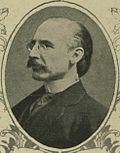Aftermath
A General Election was due to take place by the end of 1915. By the autumn of 1914, the following candidates had been adopted to contest that election. Due to the outbreak of war, the election never took place.
Following boundary changes, most of the seat made up Bothwell for the 1918 general election. Millar moved on to contest neighbouring Motherwell where he was defeated. Goff went off to contest Cleveland where he was elected. Robertson remained to contest Bothwell:
This page is based on this
Wikipedia article Text is available under the
CC BY-SA 4.0 license; additional terms may apply.
Images, videos and audio are available under their respective licenses.

